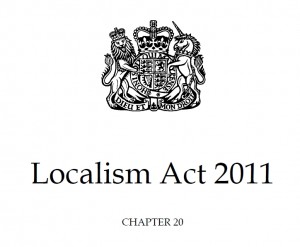 Over the last few months we have noticed that the thing people are most consistently searching for information about on our website is the new enforcement powers brought by the Localism Act 2011 – specifically that intended to crack down on concealed breaches of planning (see previous post here). There has been far more interest in this than the National Planning Policy Framework (NPPF), far more than the Community Infrastructure Levy (CIL) and even more than Matt becoming a Chartered Town Planner (MRTPI). I think that there must be a lot of people out there sitting on unlawful developments and worrying about whether the new powers will allow their local Council to come after them. Am I right?
Over the last few months we have noticed that the thing people are most consistently searching for information about on our website is the new enforcement powers brought by the Localism Act 2011 – specifically that intended to crack down on concealed breaches of planning (see previous post here). There has been far more interest in this than the National Planning Policy Framework (NPPF), far more than the Community Infrastructure Levy (CIL) and even more than Matt becoming a Chartered Town Planner (MRTPI). I think that there must be a lot of people out there sitting on unlawful developments and worrying about whether the new powers will allow their local Council to come after them. Am I right?
If this applies to you then firstly be assured that if you choose to contact us to discuss your situation we will treat it in the very strictest of confidence.
Secondly the powers, untested as they are, are not without limitation. Any breach of planning control where the time limit for taking enforcement action under section 171B of the 1990 Act(13) (time limits) has expired before 06 April 2012 is immune from the new power. The time limits are four years for operational development (i.e. building works) or for change of use of a building to a dwelling and ten years in respect of any other chase of use. Thus if it was already lawful on the 06 April 2012 through the passage of time the Council cannot try and enforce against you now – even if you deliberately concealed it. But can you prove that the works or change of use took place more than four or ten years ago?
The main untested part of the powers is what constitutes deliberate concealment and when is it just to use the power. Does it need to be active concealment or can failure to do something constitute concealment? How much concealment is necessary to trigger the power? And the extent to which natural justice will be applied particularly for say minor concealment which predated the power. As such the process could be as expensive a gamble for the Council as the original development was for you!
And the other thing to remember is that the powers if successfully applied ultimately give the Council a window in which to issue a Enforcement Notice. The landowner and occupier will still have the right of appeal against this and it is only the failure to comply with a valid Enforcement Notice which becomes an offence for which you could be prosecuted.
If you are worried about a breach of planning and need to discuss please contact Pure Town Planning for advice – in absolute confidence of course.
